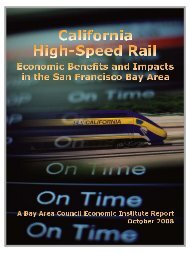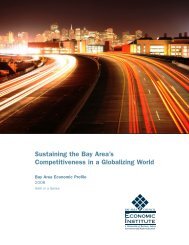Ties That Bind - Bay Area Council Economic Institute
Ties That Bind - Bay Area Council Economic Institute
Ties That Bind - Bay Area Council Economic Institute
Create successful ePaper yourself
Turn your PDF publications into a flip-book with our unique Google optimized e-Paper software.
128<br />
<strong>Ties</strong> <strong>That</strong> <strong>Bind</strong><br />
protection should be followed by actions that bring such protection<br />
into reality. And this is not a fantasy: there are constituencies<br />
inside of China that seek stronger IP protection precisely<br />
so that they can upgrade their own technology and skills base,<br />
and appropriate an adequate return from those investments.<br />
The U.S. government must also make adjustments in its approach<br />
to the Chinese semiconductor industry. Its attempts to<br />
limit access by Chinese firms to advanced semiconductor technology<br />
have merely shifted the supply of those technologies<br />
from the U.S. to Europe and Japan. China will develop a world<br />
class semiconductor industry in time, and the U.S. lacks the<br />
ability to alter that trajectory. In our view, the emergence of a<br />
globally competitive Chinese semiconductor industry will take<br />
substantial time, and is a development to be welcomed, not<br />
feared. It will likely propel the two largest economies in the<br />
world to become still more interdependent and, if managed well,<br />
can increase prosperity in both countries and worldwide.<br />
The Intellectual Property Hurdle<br />
Whether a U.S. company is a manufacturer of clothing or consumer goods, or a producer of<br />
semiconductor equipment or software, IP concerns in China sooner or later must be dealt with.<br />
Protection of intellectual property topped the list of post-WTO concerns among foreign companies<br />
exporting to and investing in China, in a U.S.-China Business <strong>Council</strong> 2005 survey. Although<br />
the PRC has laws on its books protecting foreign patents, trademarks and copyrights—<br />
and in 2001 strengthened those laws to conform with WTO standards for Trade-Related Intellectual<br />
Property Rights (TRIPS)—enforcement has been uneven at best in areas ranging from<br />
CDs and DVDs to software to pharmaceuticals to luxury consumer goods. IPR protection is<br />
slowly improving, particularly in major business centers like Beijing and Shanghai, but falls off<br />
sharply in more remote jurisdictions.








